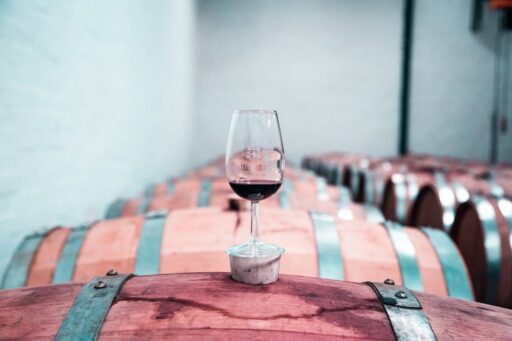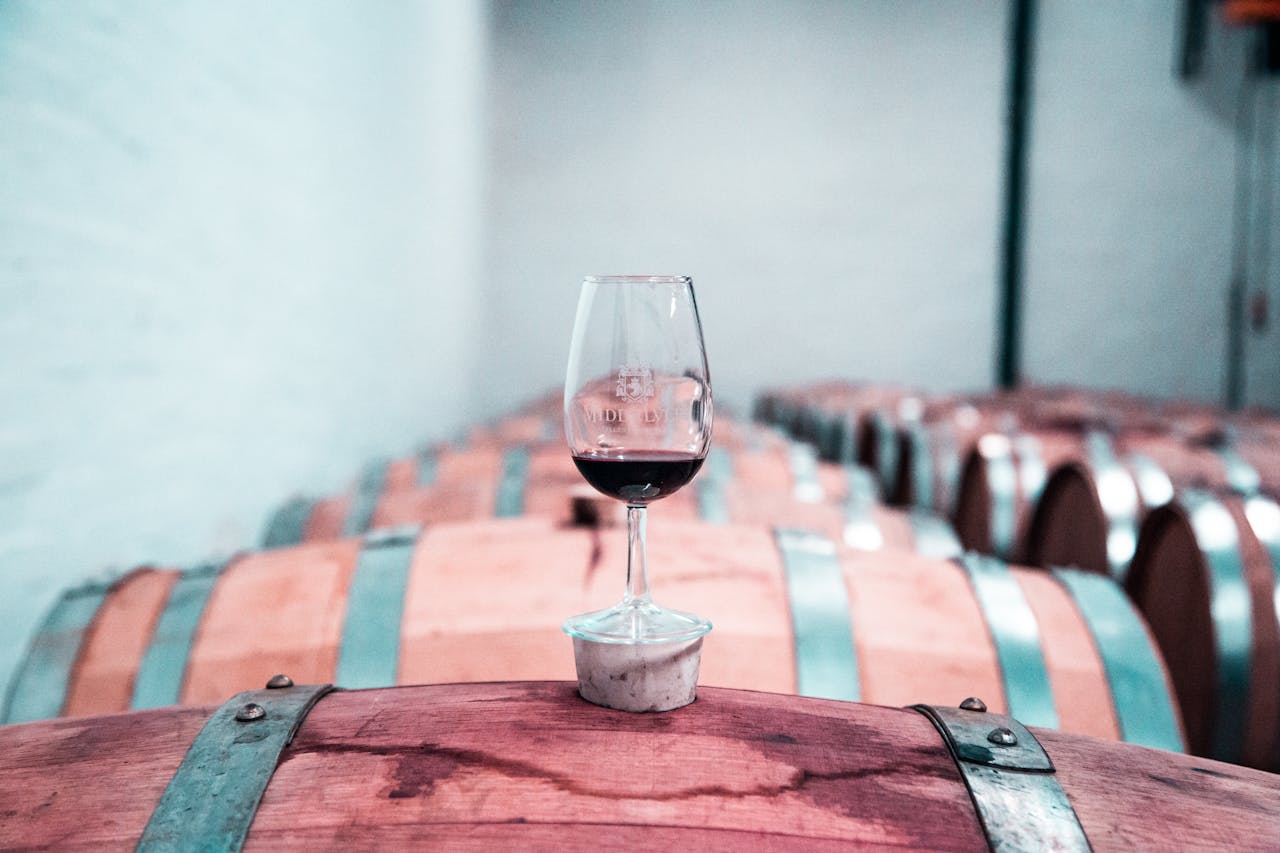If you’re looking to diversify your investment portfolio, wine is something you probably haven’t considered yet. But, investing in wine is possible for everyday investors, even with little money and knowledge about the industry.
You don’t have to be in the upper class or become an experienced Sommelier to invest in wine. Anyone with some money to spare and a little bit of interest can easily curate their own portfolio of wine investments.
Reasons to Consider Investing in Wine
Investing in wine offers a unique opportunity for diversification and potential long-term growth. You may also appreciate the fact that wine is a tangible asset with intrinsic value and isn’t correlated to the traditional asset classes.
Here are several compelling reasons why adding wine to your investment portfolio could be advantageous:
Tangible Asset with Intrinsic Value: Unlike stocks or bonds, wine is a tangible asset with inherent value. Each bottle represents a physical asset that can be enjoyed or traded, providing a sense of security and stability to investors. Plus, every time a bottle of wine is opened, the supply decreases, which can boost the price of the remaining bottles. A dwindling collection of fine wine, especially vintages, is a key reason why wine appreciates in the long term. Plus, no one can create vintage fine wines out of thin air the way governments can print money.
Strong Historical Performance: Over the long term, fine wine investing has demonstrated the potential for impressive returns. According to various indices tracking wine prices, such as the Liv-ex Fine Wine indices, fine wine has outperformed many traditional asset classes, including equities and gold, over certain periods. For context, in the past decade, the annualized returns for fine wine stood at around 13.6%, which outperforms global equities and ETFs while being a lot less volatile than real estate and gold.
Limited Supply and Increasing Demand: Fine wine is produced in limited quantities, with factors such as vintage variation and vineyard scarcity contributing to its rarity. As global demand for fine wine continues to rise, particularly in emerging markets like China and India, the imbalance between supply and demand can drive prices upward.
Potential for Significant Capital Appreciation: Climate and weather affect the quality of grapes, meaning each harvest has a unique taste and characteristics, despite being from the same vineyard and grape variety. Investing in young, promising vintages or iconic producers can offer the potential for significant capital appreciation over time, particularly for investors with a long-term investment horizon. For perspective, between 2010 and 2020, certain wine bottles made a return of 888%.
Hedge against Inflation: Wine is often considered an inflation-resistant asset, as its value tends to appreciate over time, keeping pace with or even outperforming inflation rates. Investing in wine can therefore serve as a hedge against the erosion of purchasing power caused by inflation. Moreover, during the 2008 recession, the Liv-ex Fine Wine 1000 index only shed 0.6% compared to the S&P 500’s 38.5% loss.
Diversification Benefits: Including wine in a diversified investment portfolio can reduce overall portfolio risk by providing exposure to an asset class with a low correlation to traditional financial markets. This can help mitigate the impact of market downturns and enhance portfolio resilience.
Prestige and Enjoyment: Beyond financial returns, investing in wine offers the opportunity to indulge in a passion for enology and wine culture. Owning and collecting fine wines can be a source of pride and enjoyment, whether through tasting experiences, cellar management, or attending wine-related events.
Alternative Investment Avenue: For investors seeking alternative investment opportunities beyond stocks and bonds, wine presents an attractive option. With the rise of online platforms and market transparency, investing in wine has become more accessible and streamlined, democratizing access to this asset class.
Understanding Online Wine Investments Platforms
For ages, only institutional investors and high-networth individuals had access to fine wine investments. However, technology has made investing in fine wine accessible to everyone. Today, you can start investing in rare investment wine bottles through mobile apps or with a few clicks of a mouse.
Now, let’s look into some of the best wine investment platforms available today.
1. Vinovest
Vinovest is a leading wine investment platform, offering a seamless and straightforward way to make wine investments. The platform lets you buy, store, and sell rare and authentic wines on the go. The platform uses AI that essentially uses extensive data to suggest several wine bottles that are specifically suited to your investment profile and portfolio. It considers data such as the wine’s history, critics’ reviews, provenance, prices, and longevity.
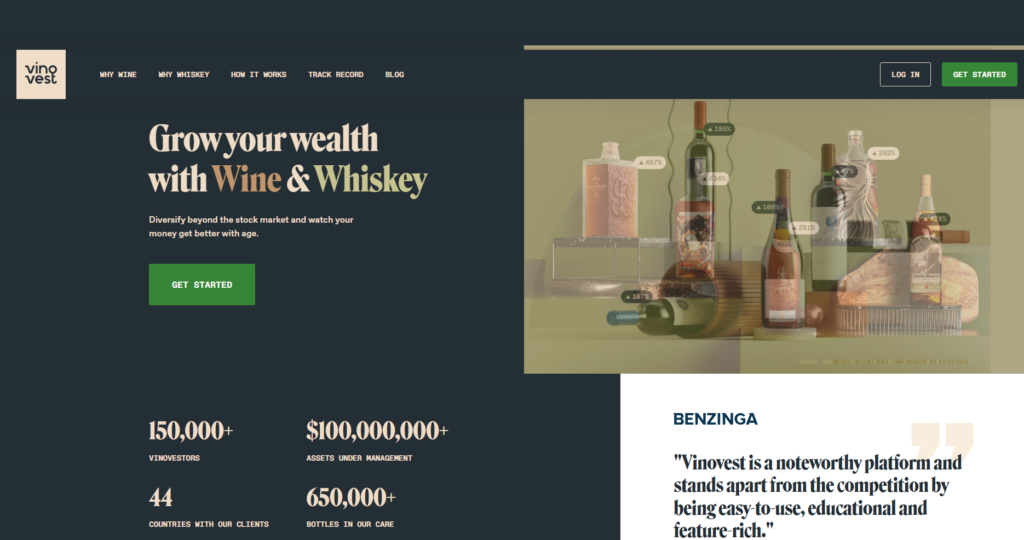
Here’s what makes it a standout choice:
Expert Curation: Vinovest’s team of sommeliers, AI, and data scientists curate a diverse portfolio of investment-grade wines from around the world, ensuring quality and potential for appreciation.
Technology-driven Platform: The platform utilizes cutting-edge technology, including AI-driven algorithms, to analyze market trends and make data-driven investment decisions.
Managed Storage: Vinovest handles all aspects of wine storage, including insurance, security, and authentication, ensuring the integrity of investors’ collections. They have state-of-the-art facilities in Switzerland, New York, and France.
Accessibility: With a low minimum investment requirement, Vinovest makes wine investment accessible to a wide range of investors, from novices to seasoned collectors.
Great prices and tax advantages: Vinovest sources wines directly from global wine exchanges, wineries, and top merchants, which gives them access to great prices. They also store the wine in a bonded warehouse with no VAT or excise duty for tax benefits.
2. Cult Wine Investment
This is a London-based wine investment company founded in 2007 that provides an AI-driven wine portfolio advisor. Cult Wine Investment stands out through its exclusive experiences for investors, such as curated tastings, invitations to partner events, and vineyard visits, which adds a layer of richness to the investment journey.
Cult Wine assesses investors’ risk appetite when creating a wine portfolio for each investor. The minimum investment is about £10,000 (or $12,000) and comes with an annual storage and management fee of about 2.25% to 2.95% depending on the size of your portfolio.
When signing up, you’ll choose from four tiers based on your account size: Cru Classé (From $10k), Premier Cru (From $35k), Grand Cru (From $150k), and Cult Cru (From $700k). The higher tiers provide priority access to exclusive events, wine releases, and experiences, from bespoke trips to partner estates to exclusive access to private vintage releases.
Features:
In-depth Analysis: As part of their due diligence, the Cult Wine team conducts a thorough analysis at both micro and macro levels. This goes a long way in helping investors make informed decisions.
AI-driven portfolio management: They use AI and data science to predict trends and look at areas where wine has the best potential to appreciate. They also constantly evaluate trends and portfolio performance to see if everything is moving as predicted.
Robust digital tools: Cult Wine provides investors with robust digital tools to manage their portfolios. One of these is Vintel, which is a web application that helps to automatically analyze wines and actively manage portfolios.
Access to bespoke experiences: Depending on your tier, Cult Wine offers investors early access to offers and new releases; invitation-only events with wine producers; vineyard tours upon request; and invitations to exclusive partner events.
3. Vint
Vint is an SEC-regulated wine and spirits investment company that lets non-credited US investors invest in wine collections from around the world. If offers fractional ownership, meaning you can invest in their diversified portfolio for a fraction of what it would cost you to actually buy and store the wine yourself.
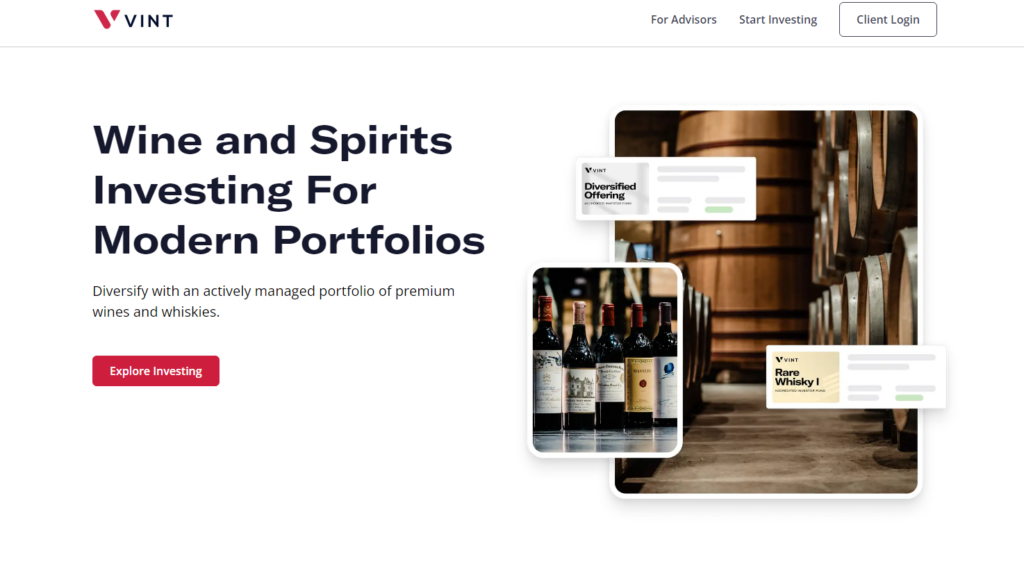
Once you open an account with them, you can deposit money and start buying shares in a wine collection of your choice. Every collection has a fixed amount of shares sold by a given date, or all investments are returned. Owning shares means you are a part-owner of the given wine collection via an LLC.
Vint shines in its relatively low investing minimums, allowing you to invest in several collections to diversify your portfolio quickly. The company will handle all the sourcing, research, and storage to keep the assets safe. Vint also doesn’t charge investors annual management fees. They instead take between 0.5% and 10% of every offering when the funding phase closes.
Features:
Straightforward Investing: The wine collections available on Vint is distributed as a finite number of shares at a fixed price, just as with stock IPOs. the value of your share will increase (or decrease) in proportion to the value of the collection, just as with stocks.
Diversified exposure: Vint gives you exposure to some of the best investment wines as curated by a team of wine investment professionals. With new collections going live every two weeks or so, Vint is excellent if you want to build a well-diversified fine wine portfolio
Works with self-directed IRAs: Vint lets you use your self-directed IRA to invest, which makes it a great option if you’re looking to invest for retirement and are considering adding wine to your portfolio.
4. ALTI Wine Exchange
ALTI Wine Exchange is a platform designed to connect wine producers and investors on a blockchain-based platform. The company is based in Hong Kong, though its wine is stored in Bordeaux City Bond, France.
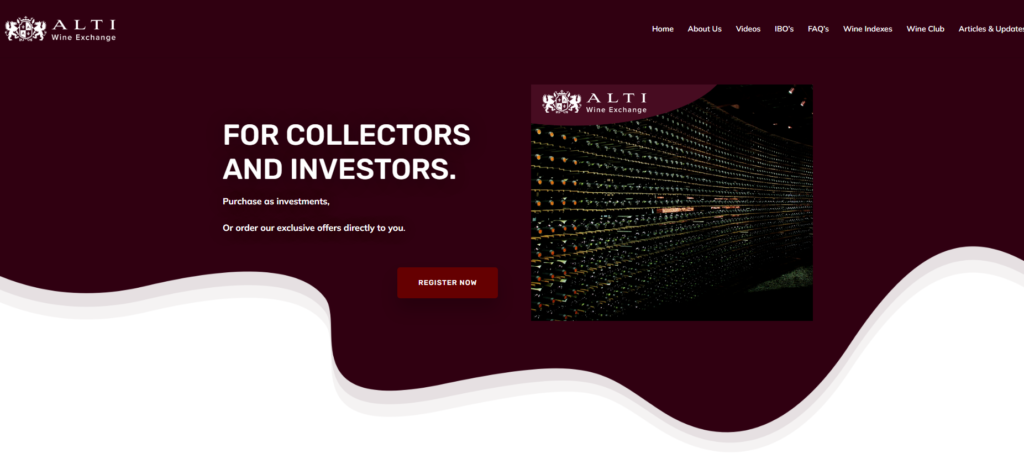
The platform works by assigning each bottle a token that represents ownership, similar to how non-fungible tokens work. The exchange also provides access to live markets, where investors can browse, buy, and sell wines similar to buying stocks from the market. Each transaction is recorded on the blockchain for extra security.
For added liquidity, they offer a secondary market where investors can sell their wine whenever they deem fit. Moreover, it’s free to create an account, and there are no minimum investment requirements. You could even start with a single bottle of wine. If you want, you can have them deliver your wine to your address.
Still, it’s worth noting that as an investor, you are on your own when it comes to buying and selling wine. Plus, the exchange doesn’t support short-selling and margin trading. They also charge a 2% trading fee for each transaction.
5. Vindome
Vindome is another platform that’s aimed at simplifying wine trading for investors around the world. It’s also based on a blockchain-based live marketplace, where investors can browse wines, list bottles for sale, and build a portfolio. Vindome has no minimum investment requirements, which makes it easy for people to participate.
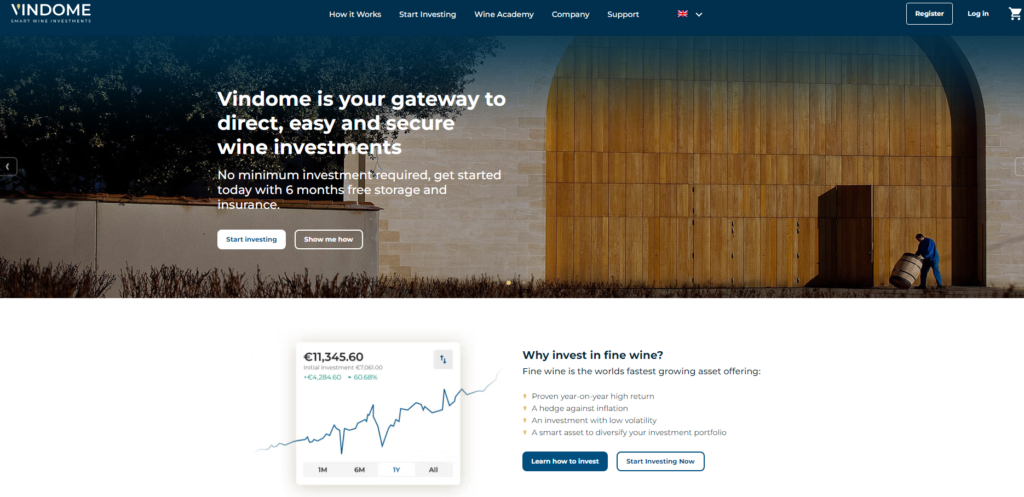
There are three main offerings on Vindome: Vindome Collections, live market, and wine futures. The live market lets you browse listings, and buy or sell bottles. For those who are not comfortable choosing specific wines, you can buy one of their curated collections. Alternatively, you could purchase wine futures, which is basically wine that’s still in the barrel before bottling.
Vindome has its headquarters in Monaco, Europe. The storage provider is J.F. Hillebrand’s warehouses, which is a renowned multinational logistics company.
It’s worth pointing out that every transaction attracts some extra fees, including insurance, commission, and storage, all of which as shown in the final payment.
Alternative Wine Investing Methods
Using wine investment apps isn’t the only way to invest in wine. Buying and storing bottles is perhaps the most obvious way. However, it requires lots of time and effort and can be tedious and risky if you’re not wealthy and very knowledgeable about wine. Here are some practical alternatives:
Wine stocks
Buying stocks in adult beverage companies is one good alternative. Most of the publicly traded alcohol companies make wines along with other spirits. A wine stock could be a holding in a bottling company, a vineyard, or a company involved in the wine industry. However, investing in wine stocks isn’t exactly ideal, considering most companies are not linked to wine directly as the underlying asset.
Wine investment funds
Wine investment funds allow you to allow investors to purchase shares in a privately managed wine portfolio, including productive vineyards, fine wines, or a combination of both. The portfolios are professionally managed by experts who are constantly looking for ways to exploit the wine markets for profit.
Is Wine Investing Worth it?
There’s no simple “yes” or “no” answer here since most wines are not good investments. With this in mind, the select few exceptional wines can be lucrative investments. It takes passion and a deep understanding of the wine industry to identify the special wines that form part of that minority and their relationship with the forces of demand and supply in the global markets.
For this reason, we’d only recommend investing in wines to people who know exactly what they are doing. If you have a special interest in wine or feel like it’s something worth exploring, you could always start with a small amount. Good luck, and may your investment age like fine wine!


